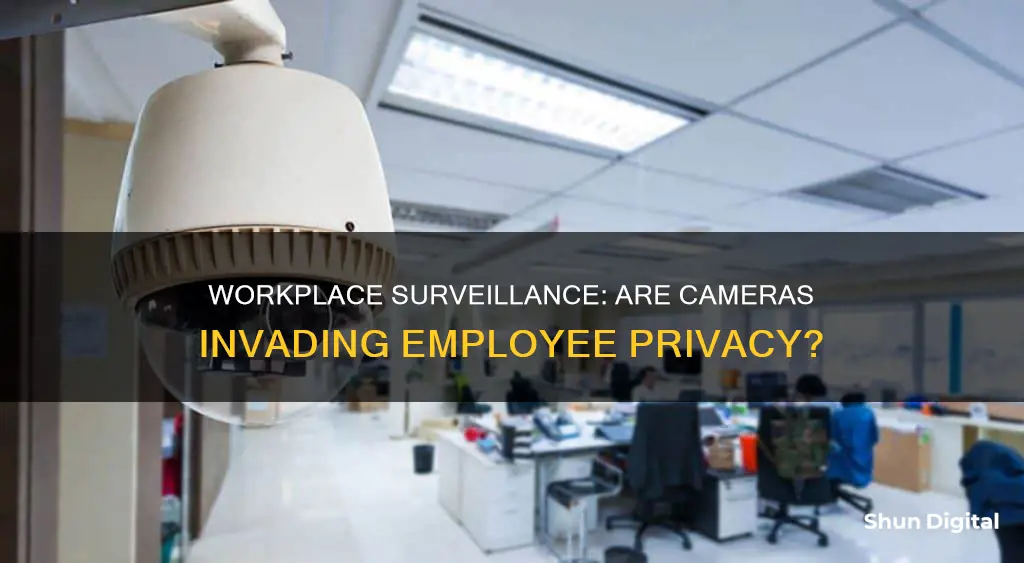
The use of surveillance cameras in the workplace is a complex issue that varies depending on the jurisdiction and the specific circumstances. While employers generally have the right to monitor their employees' activities, this must be balanced with the employees' reasonable expectation of privacy. In most cases, surveillance cameras are permitted as long as there is a legitimate business purpose, such as security or theft prevention, and employees are notified about the monitoring. However, there are legal restrictions on the placement of cameras in certain areas, such as locker rooms or bathrooms, where employees have a heightened expectation of privacy. The legality of hidden cameras is also questionable, with courts requiring employers to demonstrate a legitimate business reason for their use. The consent of employees is generally not required for video surveillance, but audio recording without consent may violate federal wiretap laws. Overall, the legality of surveillance cameras in the workplace depends on a variety of factors, including the jurisdiction, the purpose of the surveillance, the placement of cameras, and whether employee consent has been obtained.
| Characteristics | Values |
|---|---|
| Legality | Depends on state law, but generally legal if there is a legitimate business reason |
| Notification | Employees should be notified about the use of surveillance cameras |
| Location | Cameras in areas with a reasonable expectation of privacy (e.g. bathrooms, locker rooms) are prohibited |
| Purpose | Surveillance to prevent theft, monitor work habits, and ensure security is generally considered legitimate |
| Consent | Consent from employees is not always required, but their privacy rights must be respected |
| Legitimate Business Reason | Examples include security, time and motion studies, or other investigative processes |
| Invasion of Privacy | Employees can sue if they feel their privacy has been invaded |
What You'll Learn

Legality of surveillance cameras in the workplace
The use of surveillance cameras in the workplace is a complex issue that varies depending on the jurisdiction and the specific circumstances. While there is no clear "right" to privacy for employees, it is important to consider the legal implications and ethical concerns surrounding the use of surveillance in the workplace.
In most cases, employers are permitted to install security cameras in their establishments for various reasons, such as preventing theft, monitoring employee performance, and ensuring security. However, there are certain areas where surveillance is typically prohibited, such as locker rooms, bathrooms, and lounge areas, as employees have a reasonable expectation of privacy in these locations.
To ensure legality, employers must usually notify their workers about the use of surveillance cameras and have a legitimate business reason for their installation. This means that hidden cameras are generally not allowed, as they may infringe on the privacy rights of employees. In some states, such as Connecticut and California, there are stricter laws governing the use of surveillance cameras, requiring employers to provide prior written notice to employees.
It is worth noting that the use of surveillance cameras in unionized workplaces may be subject to collective bargaining agreements and labor relations laws. Additionally, federal wiretap laws prohibit the recording of certain oral communications, which is why surveillance cameras typically do not have audio capabilities.
While the use of surveillance cameras in the workplace can provide benefits to both employers and employees, it is crucial to strike a balance between security and privacy. Employers should be transparent about their surveillance practices and ensure that they are not infringing on the reasonable privacy expectations of their employees.
In conclusion, the legality of surveillance cameras in the workplace depends on a variety of factors, including the jurisdiction, the purpose of the surveillance, the placement of cameras, and whether employees have been properly notified. Employers must carefully consider these factors and seek legal advice to ensure their practices are within the bounds of the law and respect the privacy rights of their employees.
Speeding Camera Tickets: Enforceable or Not?
You may want to see also

Employees' right to privacy
In the US, the law only protects personal information held by government agencies, not private companies. It is up to private employers to act in good faith with an employee's information. Only a court can require the release of personal information. To ensure sensitive information is safe, it is recommended that employers follow certain rules. These include treating all personal information about an employee's personal characteristics, family, and friends as private and confidential, releasing information only to those who need it for legitimate or legal reasons, investigating all inquiries for information, keeping records, and using consent for release forms.
Additionally, sharing employee information with third parties is generally not considered good practice. It is also advisable to research and document who is requesting information and why, and to have an employee in human resources handle the inquiry. Getting written authorization from the employee before releasing any information is also recommended.
Electronic monitoring is allowed, and it is recommended that all monitoring policies be well-defined, documented, and given written acknowledgment by employees. If there are computer and email monitoring policies, these must clearly state that employees have no expectation of privacy when using company resources or while on company property.
Video and camera monitoring laws vary from state to state. Some states require notice to be given to employees if they are being recorded, while others allow hidden video surveillance in public places. Employers are generally required to notify employees, customers, and others in the range of the cameras that their property is under video surveillance. Video recordings must not include audio, as this violates federal wiretap law. Surveillance cameras must only be used where there is a legitimate business need to deter violence or theft, or to monitor employee productivity, and they may not be used in break rooms, restrooms, locker rooms, or other locations where privacy is expected.
Employees have the right to sue if they feel their privacy has been wrongfully invaded by surveillance cameras.
Charging Your Lumix Waterproof Camera: A Step-by-Step Guide
You may want to see also

Legitimate business reasons for surveillance
The use of surveillance cameras in the workplace is a controversial topic, with privacy issues a key concern. However, there are several legitimate business reasons for implementing video surveillance in the workplace.
Firstly, video surveillance can help deter and prevent theft and vandalism, protecting the business's assets and employees. This is particularly relevant for businesses with early or late opening hours, short staffing, or those located in high-crime areas. By strategically placing cameras in areas such as entrances, exits, cash registers, and high-value item aisles, businesses can reduce the risk of theft and vandalism.
Secondly, video surveillance can be crucial in documenting and resolving injury claims by customers or employees. Slip and fall injuries, for example, are a common source of liability for businesses, and video footage can help determine the legitimacy of such claims. In the event of a crime, video evidence can also be invaluable for identifying and convicting perpetrators.
Thirdly, video surveillance can enhance parking lot safety for customers and employees, reducing vehicle break-ins and vandalism. Adequate lighting and video surveillance of parking areas can provide a sense of security and reduce the likelihood of criminal incidents.
Additionally, video surveillance can be used to monitor employee productivity and work habits. While this may be a sensitive issue, it can help employers ensure that employees are utilising their time effectively and can free up managerial resources for more critical tasks.
Finally, video surveillance can be a useful tool in resolving internal business disputes. Whether between employees, managers, or business owners, video footage can provide objective evidence to facilitate fair resolutions and help maintain a harmonious work environment.
While these reasons provide a solid justification for implementing video surveillance, it is crucial to respect employees' privacy rights. Businesses should ensure they are complying with relevant state and federal laws regarding the placement of cameras and the use of audio recording. Employees should also be notified that the premises are under surveillance to maintain transparency and trust.
Polaroid Land Camera: Battery Power for Instant Photos
You may want to see also

Surveillance in private spaces
Legal Restrictions and Employee Privacy Rights:
In most jurisdictions, there are legal restrictions on workplace monitoring to protect employee privacy. For example, federal and state laws in the United States, such as the Electronic Communications Privacy Act of 1986 (ECPA), protect employees' right to privacy. Similarly, the Privacy Act of 1988 in Australia safeguards employees' privacy. These laws set parameters for employers, ensuring that surveillance practices do not infringe on the private spaces of their employees.
Notification and Consent:
Employers are generally required to notify their employees before introducing any surveillance technology in the workplace. This notification period allows employees to be aware of the monitoring and adjusts their expectations of privacy accordingly. The length of notification varies but is typically around 14 days, giving employees sufficient time to adapt.
Private Spaces and Off-Limits Areas:
Optical surveillance in private spaces such as bathrooms, changing rooms, and lactation rooms is strictly prohibited. Employers are not permitted to install cameras or listening devices in these areas. Additionally, some states in the US, like Connecticut, disallow cameras in lounge areas and other spaces designated for employee rest or comfort. Employers must respect these boundaries and refrain from placing surveillance equipment in off-limits areas.
Legitimate Business Purpose:
To install surveillance cameras, employers must demonstrate a reasonable and legitimate business purpose. For example, preventing theft, monitoring employee performance, or ensuring collective safety may be considered valid reasons for surveillance. However, this does not extend to invading employees' private moments or spaces without just cause.
Covert Surveillance and Court Authority:
In certain exceptional circumstances, covert surveillance without employee notification may be warranted. However, employers must first obtain authority from the courts and demonstrate adequate reason for such action. Even in these cases, courts may impose safeguards to ensure that employees' privacy rights are not completely disregarded.
Surveillance Outside of Work:
Surveillance outside of the workplace, including in company-provided vehicles, is typically against the law. Employers cannot monitor their employees' activities during non-working hours without a compelling reason. This distinction between work and private life is essential to respect employees' right to privacy when they are not performing work-related duties.
In conclusion, while surveillance in the workplace can serve legitimate purposes, it must be carefully navigated to respect employees' privacy in private spaces. Employers should always consult legal professionals and remain up to date with federal and state laws to ensure their practices are lawful and ethical.
AR Camera Mode: Enhancing Reality Through Your Lens
You may want to see also

Surveillance and consent
The use of surveillance cameras in the workplace is a complex issue that intersects with legal, ethical, and privacy considerations. While employers have legitimate interests in monitoring their employees, it is essential to respect the privacy rights of employees and obtain their consent when necessary.
Legal Considerations
In most jurisdictions, there is no absolute right to privacy for employees. However, privacy laws and regulations exist at the federal and state levels to protect employees from unreasonable intrusion. For example, in the United States, the Electronic Communications Privacy Act of 1986 (ECPA) governs the monitoring of electronic communications, while individual states may have additional laws and restrictions. Similarly, in Canada, while there is no clear "right" to privacy for workers, privacy legislation and privacy-based regulatory bodies exist to provide some protection.
Employer's Legitimate Interests
Employers often install surveillance cameras for various legitimate reasons, such as preventing theft, monitoring employee performance, and ensuring workplace safety. Security cameras can be a useful tool in achieving these objectives and are generally permitted as long as they are used in public areas and with employee knowledge.
Employee Privacy Rights
Employees also have a reasonable expectation of privacy, particularly in certain areas of the workplace such as restrooms, locker rooms, and other areas designated for employee rest or comfort. Surveillance in these areas is typically prohibited and may result in legal repercussions for employers. Additionally, employees generally expect privacy in their personal communications, and employers must obtain consent before monitoring personal devices or accounts.
Obtaining Consent
Consent plays a crucial role in the lawful use of surveillance cameras. In some cases, employers may be required to obtain written consent from employees before implementing monitoring, especially when it comes to personal devices or unionized workplaces. Even when not legally required, obtaining consent and being transparent about surveillance practices can help build trust with employees and reduce resentment.
Striking a Balance
Striking a balance between the legitimate interests of employers and the privacy rights of employees is essential. Employers should carefully consider the purpose and scope of their surveillance practices and ensure they are proportional and justifiable. By communicating openly with employees, obtaining consent where necessary, and respecting areas of expected privacy, employers can minimize legal risks and maintain a positive workplace culture.
Which Z Series Cameras Have Internal Focus Motors?
You may want to see also
Frequently asked questions
Surveillance cameras in the workplace are legal as long as there is a legitimate business reason for their installation and employees are made aware of the filming. However, cameras in areas where employees have a reasonable expectation of privacy, such as locker rooms or bathrooms, are prohibited.
Legitimate reasons for installing surveillance cameras in the workplace include:
- Preventing theft
- Monitoring work habits and performance
- Capturing evidence of a crime
- Ensuring security
- Preventing harassment and assaults
The two main restrictions on workplace monitoring are the Electronic Communications Privacy Act of 1986 (ECPA) and common-law protections against invasion of privacy. The ECPA prohibits the intentional interception of oral, wire, and electronic communications without a legitimate business purpose or consent. Additionally, federal and state laws may impose further restrictions on monitoring, such as requiring prior notification to employees.







